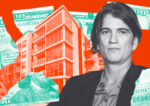 Ashcroft pays $70M for Coconut Creek apartment complex
Ashcroft pays $70M for Coconut Creek apartment complex
Trending
Syndicator Ashcroft pauses distributions, citing rate cap pain
Firm struggling with ballooning costs of interest rate caps

Ashcroft Capital, a multifamily syndicator that owns Sun Belt apartment complexes and just made a $70M South Florida acquisition, told investors it will pause Class A distributions in its first value-add fund.
Co-founder Frank Roessler, in an investor presentation shared on Wall Street Oasis, emphasized that the fund’s eight properties are still generating enough cash flow to cover loan payments.
The cash crunch, he said, stems from the exploding cost of rate caps.
When Ashcroft took out the loans in 2021, the rate caps — a protection against rising rates — ran $513,000.
“They are now $18.6 million to extend,” Roessler said.
Neither Roessler nor Ashcroft co-founder Joe Fairless, who hosts the “Best Real Estate Investing Advice Ever Show,” podcast, returned requests for comment.
The firm’s decision to pause Class A distributions signals its capital needs are steep. In a syndicated deal, Class A investors get a higher monthly return than Class B investors. Roessler said the pause would likely extend through next year.
Ashcroft, which invested heavily in the Sun Belt, could be the canary in the coal mine for multifamily syndicators.
Buyers of apartment buildings in 2021 through early 2022 tapped short-term, floating-rate loans when heavy demand for multifamily made financing tougher to get. To guard against extreme interest rate increases, many borrowers paid for caps to keep their rates from rising above a certain percentage.
But rate caps expire. Their pricing has ballooned over the past two years because it is tied to the secured overnight financing rate, a benchmark in lending that has shot up since the Federal Reserve waged war against inflation.
“In 2021 it was very inexpensive to get those rate caps,” Brian Underdahl of Nuvo Capital Partners said on a recent episode of The Real Deal’s Deconstruct podcast.
“That completely shifted after the Fed started hiking,” he added.
Syndicators often pursue value-add investing, buying properties that can be renovated to boost rents. But some haven’t had the time to execute those plans or raise revenues by enough to afford costlier caps.
Roessler said Ashcroft has fixed up half of the 2,027 units slotted for renovations across its value-add fund.
Though Fairless stressed that “operationally, we’re doing well,” both he and Roessler said Ashcroft focused on boosting revenues across the fund’s assets.
Financials shared during the presentation indicate the fund is staying just above water.
Roessler cited a 1.28 debt service coverage ratio across the fund’s eight properties, meaning cash flow is enough to pay 128 percent of monthly loan payments. Loan servicers typically flag loans if the DSCR falls below 1.25.
Roessler said Value-Add Fund I’s Florida properties aren’t the problem; the Atlanta buildings are.
The co-founder said Elliott Roswell and Elliot Apartments on Abernathy, two buildings north of Atlanta, “continue to underperform.”
The city is facing a “huge supply issue” as a mass of new units come to market, Roessler said. Ample housing supply depresses rents. Rising rates on floating-rate loans have also hurt cash flow, loan data shows.
At Elliott Roswell, ballooning interest rates drove the DSCR down to 0.71 in June from 1.46 just six months prior, servicer commentary in Morningstar noted. The property was 84 percent occupied in June, compared with 86 percent when the loan was made in 2021.
Abernathy was in worse shape. DSCR in June was 0.68 compared with 0.85 in December, according to Morningstar. The loan is also floating-rate.
Roessler told investors the property had stabilized in October. He said his team had worked through “many evictions.”
“[The team] has caused several residents with a high balance to leave the property rather than wait for their eviction to be processed,” Roessler added.
Fairless worked to align Ashcroft with investors, noting, “Frank and I have personally paid for four rate caps already.”
The co-founder said Ashcroft recently purchased a 12-month cap on a loan backed by a Jacksonville, Florida, complex for $1.4 million. A 24-month cap on the same debt cost $27,500 in 2021.
Roessler said Ashcroft was not anticipating a capital call. He added that the firm and other general partners in the deals would continue to fund shortfalls or seek preferred equity to bridge any gaps.
Unloading the assets, he said, was not an option.
“At today’s expanded cap rates, the price we would receive to sell all deals in the fund would not generate enough cash to repay invested capital,” Roessler told investors.
Throughout the call, the co-founder repeated that the pause on distributions would be temporary.
But a recent blog post on Fairless’ own podcast site reveals that’s not always the case.
“Often the pause in distributions is a result of a more expansive financial issue,” John Casmon of Casmon Capital Group wrote in August.
“This could be driven by factors such as lower-than-expected rent collection or higher-than-expected debt service,” he added. “These issues take longer to resolve.”
Read more
 Ashcroft pays $70M for Coconut Creek apartment complex
Ashcroft pays $70M for Coconut Creek apartment complex
 When the Tides go out
When the Tides go out
 Tides touts loan workouts across bulk of portfolio
Tides touts loan workouts across bulk of portfolio




